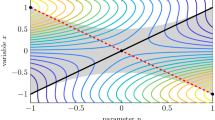Abstract
Whenever we have a set of discrete measures of a phenomenon and try to find an analytic function which models such phenomenon, we are solving a problem about finding some parameters that minimizes a computable error function. In this way, parameter estimation may be studied as an optimization problem, in which the fitness function we are trying to minimize is the error one. This work try to do that using a genetic algorithm to obtain three parameters of a function. Particularly, we use data about one village population over time to see the goodness of our algorithm.
Access this chapter
Tax calculation will be finalised at checkout
Purchases are for personal use only
Preview
Unable to display preview. Download preview PDF.
Similar content being viewed by others
References
Goldberg, D.E.: Genetic Algorithms in Search, Optimization and Machine Learning. Addison-Wesley, Reading (1989)
Jaffrezic, F., Meza, C., Lavielle, M., Foulley, J.-L.: Genetic analysis of growth curves using the SAEM algorithm. Genet. Sel. Evol. 38(EDP Sciences), 583–600 (2006)
Liu, X.-Y.: An improvement logistic model based on multiple objective genetic algorithm. In: Proceedings of the Eighth International Conference on Machine Learning and Cybernetics, Baoding, July 12-15, pp. 2292–2295 (2009)
Syswerda, G.: Schedule optimization using genetic algorithms. In: Davis, L. (ed.) Handbook of Genetic Algorithms, pp. 332–349. Van Nostrand Reinhold, New York (1991)
Whitley, D.: A genetic algorithm tutorial (2005)
Kuhn, E., Lavielle, M.: Maximum likelihood estimation in nonlinear mixed effects models. Comput. Statist. Data Anal. 49, 1020–1038 (2005)
Universidad Nacional de Colombia: Estimación de la Población Futura, http://www.virtual.unal.edu.co/cursos/sedes/manizales/4080004/contenido/Capitulo_4/Pages/caudales_continuacion1.htm
Veres Ferrer, E.: Nuevo procedimiento para el ajuste de la curva logística: aplicación a la población española. Estadística Española 108, 5–17 (1985)
Martínez, E.: Dinámica poblacional (II): la ecuación logística, http://www.uantof.cl/facultades/csbasicas/Matematicas/academicos/emartinez/calculo/poblacion/logistica/logistica.html
Poveda, R.G., Manrique, H.J.: Aplicación de la curva logística a los censos de la ciudad de Medellín. Ecos de Economía (25) (2007)
Vinterbo, S., Ohno-Machado, L.: A Genetic Algorithm to Select Variables in Logistic Regression: Example in the Domain of Myocardial Infarction. In: AMIA, Inc., pp. 984–988 (1999)
Author information
Authors and Affiliations
Editor information
Editors and Affiliations
Rights and permissions
Copyright information
© 2011 Springer-Verlag Berlin Heidelberg
About this paper
Cite this paper
Torrecilla-Pinero, F., Torrecilla-Pinero, J.A., Gómez-Pulido, J.A., Vega-Rodríguez, M.A., Sánchez-Pérez, J.M. (2011). Parametric Approximation of Functions Using Genetic Algorithms: An Example with a Logistic Curve. In: Dimov, I., Dimova, S., Kolkovska, N. (eds) Numerical Methods and Applications. NMA 2010. Lecture Notes in Computer Science, vol 6046. Springer, Berlin, Heidelberg. https://doi.org/10.1007/978-3-642-18466-6_37
Download citation
DOI: https://doi.org/10.1007/978-3-642-18466-6_37
Publisher Name: Springer, Berlin, Heidelberg
Print ISBN: 978-3-642-18465-9
Online ISBN: 978-3-642-18466-6
eBook Packages: Computer ScienceComputer Science (R0)




